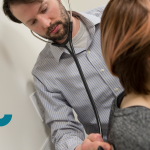Share
PRP therapies—avoiding the risk of disease transmission
Lessons learned from vampire facials
Last year, the New Mexico Department of Health shut down a spa after reports of poor infection prevention and control practices. Their investigation later revealed that two spa visitors contracted HIV after getting vampire facials, a type of Platelet Rich Plasma (PRP) treatment.
Unsafe storage and handling of needles caused the visitors to contract HIV. The New Mexico Department of Health has since urged consumers who had this treatment at the spa to be tested for HIV and hepatitis B and C.
A vampire facial is a PRP procedure where a consumer’s blood is put through a centrifuge to isolate blood plasma. The plasma is then applied to their face, either by laser or paired with micro-needling of the skin.
The desired effect is to stimulate collagen production and make the skin appear more youthful.
While the facility responsible was not a medical facility, this case study makes one thing explicitly clear: the risks of using blood products, even when the blood belongs to the patient, are potentially serious. Having a strong control over sterility, universal precautions and careful labelling are all critical components of ensuring patient safety.
Health Canada recently determined that PRP treatments, which differ from stem cell treatments, fall under the scope of the practice of medicine and dentistry. With that in mind, here are just a few things to consider if you offer PRP or want to offer it in the future:
- Is the purpose of the treatment a recognized application?
- Are there any relative contraindications to the PRP therapy?
- Are your commercial kits and centrifuges approved by Health Canada?
- Are you following appropriate blood and body-fluid precautions?
- Is your documentation complete, including informed patient consent?
- Who will be performing the procedure?
- How much training is required and how will they be trained?
We encourage all physicians to review and share the CPSA Guidelines for performing Autologous PRP in Clinic Settings. If your patients have questions about these procedures, we encourage you to communicate the expectations around best practice to help them choose a healthcare professional who meets or exceeds these safety guidelines.
Questions about PRP? Contact us at PRP@cpsa.ab.ca.
Related News
All News & EventsOctober 2, 2020
Dr. Barry Allen Lycka of Edmonton sanctioned by CPSA for inappropriate relationship with patient
October 1, 2020
Dr. John Slanina of Sherwood Park sanctioned for personal relationship with patient
October 1, 2020
Consultation 019 closes in two weeks: provide your feedback on our standards of practice on Closing or Leaving a Medical Practice, Job Action, and Relocating a Medical Practice
September 30, 2020
























Comments for this post are now closed. If you would like to share your feedback on this topic, please email support@cpsa.ca.